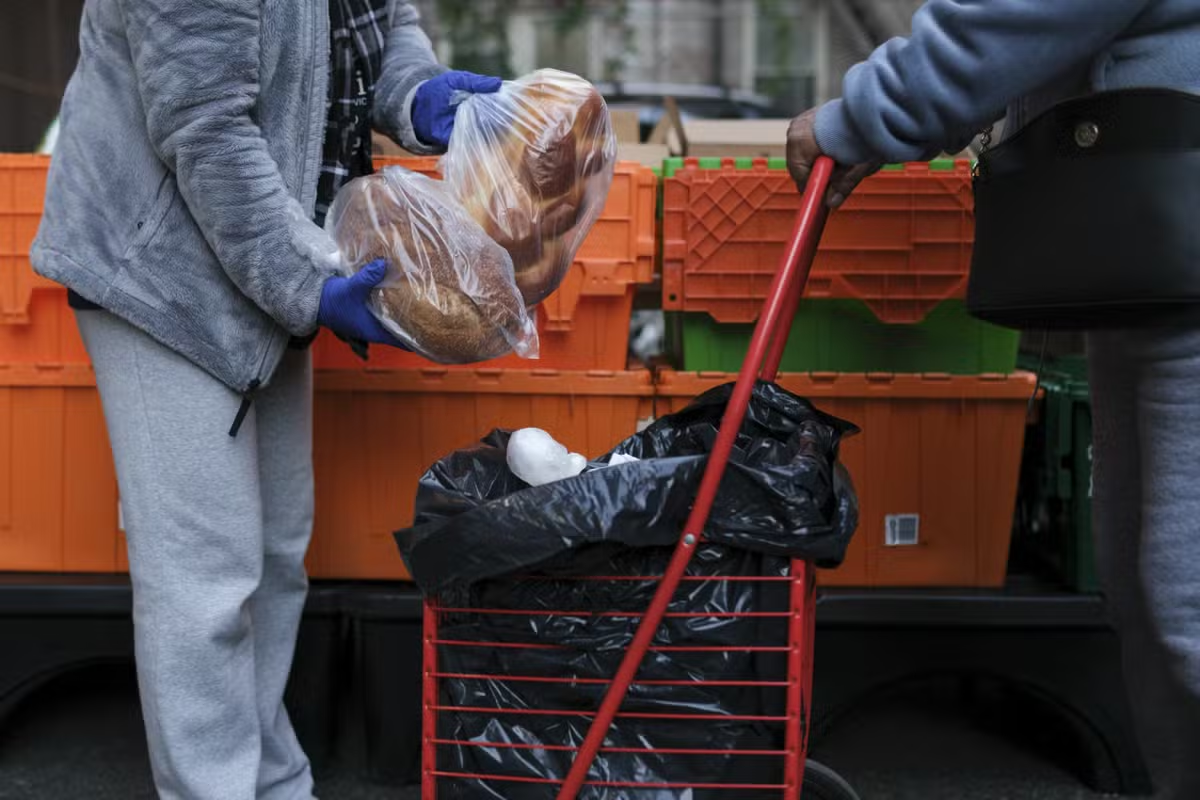
- “shutdown”: More than 1,500 flights canceled on second day of travel reduction order
- Search for garbage food and inventory: 42 million Americans not receiving food assistance report hardship during shutdown
On Sunday, officials in several states said it was unclear how the Trump administration’s latest directive would affect the SNAP program, which serves 1 in 8 low-income Americans. The program has already faced major challenges in recent days as President Trump and his top advisers refuse to make full payments to beneficiaries as the government shutdown continues.
Some of the 42 million people enrolled in SNAP began receiving their full benefits Friday after a federal court ruling ordered the Trump administration to fully fund the program this month amid the shutdown. States including New York, Oregon, Pennsylvania and Wisconsin rushed to help their residents, some of whom went days without food supplies.
But soon after, the Supreme Court temporarily put the judge’s order on hold to allow an appeals court to investigate further, leaving the entire program in legal limbo. That analysis is still underway, and its results could determine whether the government needs to tap into its vast reserves, totaling tens of billions of dollars, to maintain full SNAP benefits this month.
The Department of Agriculture and the White House Budget Office did not respond to requests for comment on the situation.
Rep. Angie Craig (Minnesota), the top Democrat on the House Agriculture Committee, said in a statement that she believes the Trump administration is “demanding that food assistance be withdrawn from families already receiving it.”
“They would rather go door to door and take food from people than do the right thing and fully fund SNAP in November so veterans, seniors and struggling children can put food on the table,” she said.
Although the food stamp program is funded by the federal government, it is primarily administered by states. To provide benefits, the state sends the file to a processor. The processor administers the Electronic Benefits Transfer System, known as EBT. These providers make funds available on EBT cards, which is the primary way SNAP recipients buy groceries.
The Department of Agriculture said late Saturday in guidance that states cannot send the files needed to provide full benefits to EBT processors. Instead, the agency said states should only submit for “partial” benefits, and food stamp recipients would see significantly reduced payments.
“This was unauthorized to the extent that each state submitted a complete SNAP payment file for November 2025,” wrote Patrick A. Penn, a senior Department of Agriculture official. “Therefore, states must immediately rescind the actions they have taken to provide full SNAP benefits for November 2025.”
David A. Super, a professor at Georgetown University Law Center, said it would not be “legal” for the government to take back benefits already granted without guaranteeing people due process.
But the federal government tried to block states from completing the process of fully distributing SNAP benefits to low-income households, Super added. He said the memo could serve to “scare states that are midway through the process and tell them to back off.”
- read more: Understand what SNAP is, the food assistance program affected by the U.S. government shutdown.
Officials in at least one state, Wisconsin, publicly refused Sunday to comply with the Trump administration’s new directive, citing the potential for economic harm to residents. “No,” Democratic Gov. Tony Evers said in a statement. The state said it will continue to fight “the Trump administration’s efforts to strip food assistance from Wisconsin’s children, families, and seniors.”
Wisconsin officials have also criticized the federal government for trying to block some of the complex, bureaucratic deals that help reimburse grocery stores that accept SNAP. They brought the case to the attention of a federal judge in Massachusetts, who is reviewing requests from about 24 states, including Wisconsin, to force the Trump administration to return all SNAP funds.
As part of the lawsuit, state leaders asked a judge Saturday to protect them from federal penalties for how they handled food benefits during this time of legal uncertainty. In their petition, they pointed to a series of conflicting directives from the USDA, which suggested it was preparing to release funds to pay off temporary food stamps in full.
- “Shutdown” in the United States: Understand what the strike is and its impact in the country
Justice Department lawyers vehemently opposed the states’ request in a formal response filed with the court on Saturday. The petition comes as the Trump administration increasingly threatens to punish local officials who allocate the full amount of food stamps.
The Department of Agriculture said in a memo that if states do not comply, they could lose access to some of the federal funds used to administer the SNAP program and could be held responsible for funding all benefits not authorized by the federal government.
“It’s about brutality,” said Sen. Amy Klobuchar, a Minnesota Democrat who heads the House Agriculture Committee and leads the party. In a social media post, she added, “It’s their choice whether to do this or not.”



